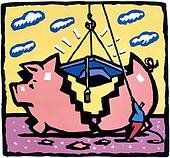
I met a guy in law school who had an interesting approach to reducing his student loan debt. He told me during our second semester at Florida State that he had already borrowed some $70,000 in student aid and intended to borrow an additional $120,000 by the time he graduated. He drove a brand new Mercedes, lived in the most expensive apartment complex and had already paid for an expensive off campus summer semester program at Oxford which he planned to attend. All of this was funded with student loans.
I contrast his law school lifestyle with mine. My wife and I lived in a shoebox with our three year old son. I ran an early morning paper route to make ends meet and watched our son at night when she went to work as a nurse. I drove a beat up 10 year old Ford Ranger I bought for $1,500. The truck was in such bad shape and so rusted out that the front left brake caliper punched through the rotor one morning while on my paper route causing the wheel to lock up and the truck to come to a screeching halt. Thank goodness I was the only person on the road at the time. But I digress.
It took one semester for my friend to realize that he was not going to finish in the top 30% of our class and that he may be looking at a starting pay of $30,000 when he graduated. He didn't seem concerned. I asked him how he was going to handle all of the student loan debt he was racking up while in law school. He told me he wasn't. His plan was that once he graduated from law school his first stop would be to the U.S. Bankruptcy Court in Tallahassee to file for bankruptcy and start over with a clean slate. It sounded like a pretty solid, well thought out plan; at least until our second year of law school when we enrolled in Bankruptcy 101.
Bankruptcy Does Not Discharge Most Student Loans
I learned a number of interesting things during my second year of law school, not the least of which is that bankruptcy does not discharge student loans unless certain very limited factors are present (none of which applied in my friend's case). As you can imagine this came as quite the surprise to both of us. Since then I have learned that there are other debts (known as "priority debts") that bankruptcy does not discharge. Among these debts are child support, recent federal, state and local taxes, DUI related debts, government imposed fines, and debts not listed on the original bankruptcy notice.
Factors For Granting Discharge of Student Loan Debt
If you are wondering what factors can lead to the discharge of a student loan debt in bankruptcy for hardship it is important to note that the Bankruptcy Code does not specifically define such requirements. One absolute discharge is death and you don't even need bankruptcy for that. I often tell my wife that among other things she can be thankful for when I die is that we will no longer have to pay on my student loan debt. The earlier the better, right.
If death is not the discharge you are looking for, most courts will apply a three-part test to determine eligibility for hardship discharge:
1) Income -- if the debtor is forced to pay off the student loan, the debtor will not be able to maintain a minimum standard of living for himself or herself and his or her dependents;
2) Duration -- the financial circumstances that satisfy the income test in (1) will continue for a significant portion of the repayment period; and
3) Good Faith -- the debtor must have made a good-faith effort to repay the loan prior to the bankruptcy.
As for my friend, he is now buried under a mountain of student loan debt. If you ask him, though, he will tell you it was worth every penny. My advice: Don't ask him.